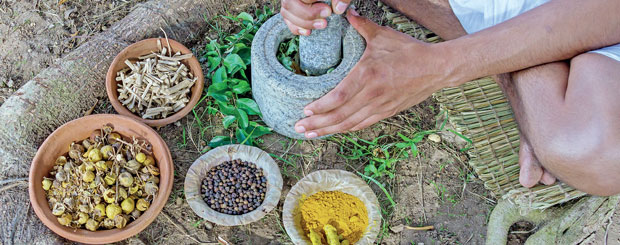23 Feb 2017 - {{hitsCtrl.values.hits}}

 Ayurveda is derived from the sanskrit words “ayush” meaning life and “veda” meaning science. Ayurveda is an Indian health science which is not just limited to medical aspects and treating disease but also focuses on the wellness aspect, maintaining health and improving quality of life. Its not about living without any illness but how to live physically, mentally, spiritually and socially and leading a happy and healthy life. Ayurveda texts explains health as;
Ayurveda is derived from the sanskrit words “ayush” meaning life and “veda” meaning science. Ayurveda is an Indian health science which is not just limited to medical aspects and treating disease but also focuses on the wellness aspect, maintaining health and improving quality of life. Its not about living without any illness but how to live physically, mentally, spiritually and socially and leading a happy and healthy life. Ayurveda texts explains health as;
‘sama dosa, sama dhathu, sama agni mala kriya – prasanna aatma indriya manas swasta ityabhideeyate’
The balance of active components [body physiology], structural components [body anatomy], metabolic components, waste product functions [altogether balance of physical body] and the balance and well-being of spirituality, sensory organs and mental functions [altogether balance of psycho-spiritual body] is considered a healthy state. In the modern day too, the world health organization defines health as:
“Health is a state of complete physical, mental and social well-being and not merely the absence of disease or infirmity.”(http://www.who.int/about/definition)
It is quite interesting to take this definition of health or a healthy state into consideration. We can all agree that not having a physical, structural or functional abnormality or imbalance can be considered healthy. Sama dosa means the balance of the three dosas of the body, namely vata – pitta and kapha. Ayurveda believes that the body is made up of these 3 dosas and body functions are controlled according to their characteristics and qualities. Balance doesn’t necessarily mean that a person should have all these dosas in equal amounts. Ayurveda believes in equity rather than equality. Meaning that, if a person is born with certain proportions of these three dosas, maintaining those proportions throughout their lives and not letting the dosas aggravate or diminish causing abnormality and disease during their lifetime can be considered sama dosa. This is explained further in Prakirti or Natural Body Constitution, according to Ayurveda.
Dhatu means body tissues. According to Ayurveda, there are 7 main body tissues. Namely, rasa [body serum/fluids], rakta [blood], mamsa [muscles], medas [fat tissues], asti [bones and cartilage], majja [marrow] and sukra [reproductive tissue]. This definition encompasses a broader meaning than the direct translations. Sama dhatu again doesn’t mean that everybody has to have these tissues in equal proportions but in proportion to function well and to live a complete life.
Sama Agni is a very interesting concept in Ayurveda. It is the balance of metabolic activities in the body. Lets call it “good digestion”. Whatever is ingested into the body has to be digested well and should be utilized well too. That is, if you eat something, it needs to be properly digested in the gut and the nutrients need to be properly used too. If you eat more than your use up, there can be an excess of food stuff, leaving undigested parts in the body. These are what are later turned into toxins and cause disease. Therefore, having good digestion is a very important bodily function. Or according to Ayurveda, Sama Agni. Sama mala is having a balance in waste products. That is to say, whatever you consume has to be properly digested and excreted. Not just mass wastes but micro wastes, that are generated as a result of digestion and metabolism, and should not be left inside the body but passed out. Otherwise, they can become toxins and cause illness. If nutritional substances in the body are passed out as waste, that too is bad. As in the case of Diabetes mellitus, glucose is passed out with the urine. Glucose is a nutritional substance that is useful to the body. When any nutritional substance is passed out, it is not normal. Then it is a disease or imbalance of mala.
Let’s talk about well-being mentioned as psychological and spiritual aspects of a human. Prasanna aatma or well balanced lively spirit is an important part of a healthy person. If your spirit is weak, depressed or negative, then you are unhealthy. People should be happy and pleasant in their daily lives. Sadness, anger, jealousy, greed and other negative thoughts and feelings are deviations of this normalness. They may occur in certain situations but should not to be maintained consistently. Also having harmful thoughts towards others - humans, animals or even the environment is not normal. Abuse, addiction and such are also abnormal and can be considered a disease. Therefore, Prassan aatma and Prasanna manas, spiritual well-being and mental balance, taken together as one unit are important factors of health. We will talk more in detail about it in the future.
Prasanna indriya is the well-being of the sensory organs. Apart from the 5 main sensory organs we commonly know- eyes, ears, nose, mouth (tongue) and skin, there is also the mental eye or the sixth sense. The sixth sense is intuition or gut feeling. The sense of right and wrong, cultivated from the above mentioned prassan aatma and manas.
Basically health is being good to yourself as well as others in your society, including animals and the environment you live in. It is not simply living without an illness. It is a much more rich and wholesome concept. Living is not just a period between birth and death but enjoying a fulfilled life.
So my wish for everyone is to have a fulfilled life.
25 Dec 2024 21 minute ago
25 Dec 2024 27 minute ago
25 Dec 2024 37 minute ago
25 Dec 2024 1 hours ago
25 Dec 2024 3 hours ago